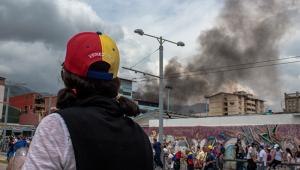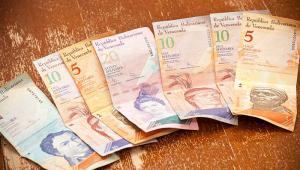Gregory Makoff, senior fellow at Canada’s Centre for International Governance Innovation, said in a paper published by the World Economic Forum that Venezuela had squandered its natural advantages and faced a humanitarian crisis.
The country’s socialist president Nicolas Maduro held a poll last weekend - boycotted by opposition parties - to elect a constituent assembly with powers to rewrite the constitution to effectively bypass the opposition-controlled congress.
According to the American think-tank the Council on Foreign Relations, Venezuela is highly vulnerable to external shocks due to its heavy dependence on oil revenues, which account for 25% of GDP and 95% of export earnings.
The council said that as global oil prices fell from $111 barrel in 2014 to only $27 in 2016 “Venezuela’s already shaky economy went into free fall” with GDP falling by 10-15% as inflation soared to 800%.
Venezuela now owes $140m to foreign creditors but has only $10m in reserves.
Makoff wrote: “The current economic and social disorder in Venezuela calls for a re-engagement with the international financial institutions that would help to restore normal market mechanisms in its economy.
“While ideologically repugnant to the current leadership, a pragmatic approach could unlock billions of dollars in aid and debt relief for a nation in chaos.”
He contrasted the country’s fate to that of Mexico, Colombia, Chile and others in Latin America which “have enjoyed steady growth and established full financial independence while adhering to a market approach” and borrow when felt necessary on their own terms.
Re-engaging with international financial institutions could see Venezuela able to unlock significant financial assistance to meet humanitarian needs and re-orientation of the economy.
“Just by starting the process, several billion dollars of assistance might be unlocked in weeks – with minimal conditions – to help Venezuela meet urgent needs,” Makoff wrote.
“Much more significant assistance could come once Venezuela reaches agreement on a detailed medium-term economic plan with the International Monetary Fund and the World Bank, which would entail months of painful negotiations.”
IMF assistance to Greece, Ukraine and Jamaica in recent years could serve as examples of what could be done for Venezuela, he added.
“Creditors gave substantial financial concessions...because they realised that a disorderly default would be the outcome if they didn’t play ball,” Makoff wrote.
“This is how it would work in Venezuela: no debt swap, no IMF – it’s a powerful tool to help a country get a fair deal.”













